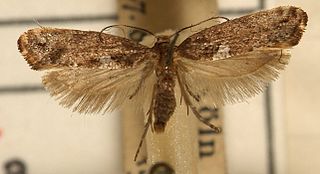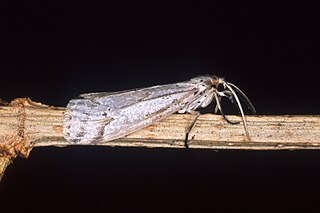
Yponomeutoidea is a superfamily of ermine moths and relatives. There are about 1,800 species of Yponomeutoids worldwide, most of them known to come from temperate regions. This superfamily is one of the earliest groups to evolve external feeding and to colonize herbs like shrubs and trees.

The Acrolepiidae are a family of moths known as false diamondback moths. In modern classifications, they are often treated as a subfamily (Acrolepiinae) of the family Glyphipterigidae.

The Plutellidae are a family of moths commonly known as the diamondback moths, named after the diamondback moth of European origin. Some authors consider this family to be a subfamily of the Yponomeutidae, but it is usually considered to be a family in its own right, and have three subfamilies, Plutellinae, Praydinae, and Scythropiinae.

The leek moth or onion leaf miner is a species of moth of family Acrolepiidae and the genus Acrolepiopsis. The species is native to Europe and Siberia, but is also found in North America, where it is an invasive species. While it was initially recorded in Hawaii, this was actually a misidentification of Acrolepiopsis sapporensis.

Acrolepia is a genus of moths in the family Acrolepiidae.

Acrolepiopsis is a genus of moths in the family Acrolepiidae.

Acrolepiopsis betulella is a moth of the family Acrolepiidae. It is found in most of central and western Europe. It was believed to be extinct in Great Britain, with 19th-century records from damp woodland in County Durham and Yorkshire and 20th-century records from Scotland, until a specimen was captured in County Durham in spring 2012.

Digitivalva reticulella is a moth of the family Acrolepiidae found in most of Europe, except Ireland, Great Britain, the Netherlands, France, Portugal, Slovenia, much of the Balkan Peninsula, and Lithuania.
Digitivalva orientella is a moth of the family Acrolepiidae. It is found in Slovenia, Croatia, Romania, the Republic of Macedonia, Ukraine and Russia. It has also been recorded from Turkey.
Digitivalva hoenei is a moth of the family Acrolepiidae. It is found in China (Yunnan).
Digitivalva asiatica is a moth of the family Acrolepiidae. It is found in China.
Acrolepiopsis sinense is a moth of the family Acrolepiidae. It is found in China (Zhejiang).
Acrolepiopsis deltoides is a moth of the family Acrolepiidae. It is found in China (Zhejiang).
Acrolepiopsis leucoscia is a moth of the family Acrolepiidae. It was described by Edward Meyrick in 1927. It is found in the central United States, from Texas north to Illinois, Missouri and Ohio.
Acrolepiopsis californica is a moth of the family Acrolepiidae. It is found in western California, western Oregon and Alberta.
Acrolepiopsis heppneri is a moth of the family Acrolepiidae. It is found from Connecticut and New Hampshire in the east, south to Tennessee, Alabama and Mississippi, and west to Illinois.
Acrolepiopsis incertella is a moth of the family Acrolepiidae. It is found in the eastern half of North America, from southern Ontario to Florida and Mississippi in the south and to Illinois and Michigan in the west.
Acrolepiopsis reticulosa is a moth of the family Acrolepiidae. It is only known from two widely separated locations in Wyoming and New Mexico.
Acrolepiopsis peterseni is a moth of the family Acrolepiidae. It was described by Reinhard Gaedike in 1994. It is found in Russia.
Epermenia sinica is a moth in the family Epermeniidae. It was described by Reinhard Gaedike in 1996. It is found in Yunnan, China.






